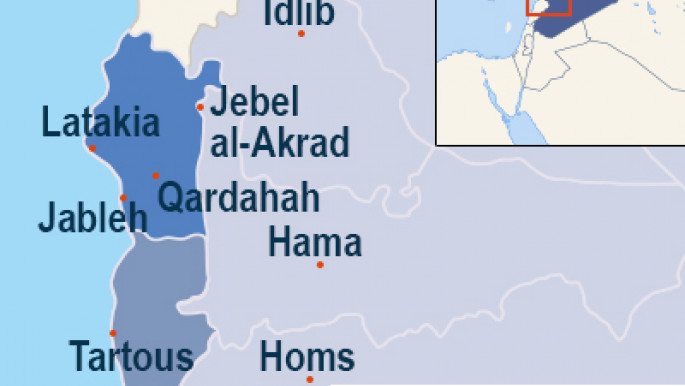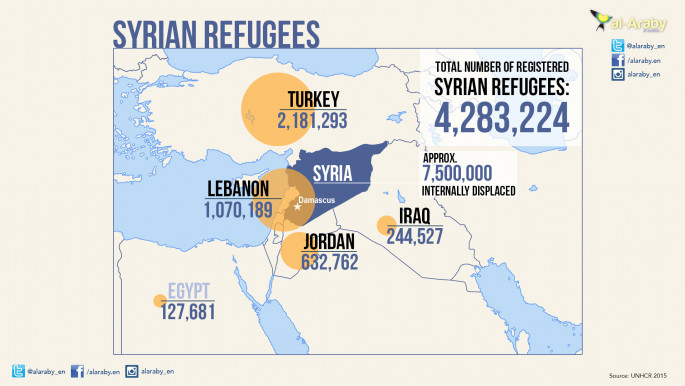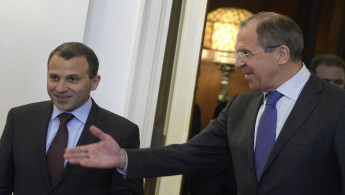Russia asks Lebanon for intelligence ahead of Vienna talks
Al-Araby al-Jadeed obtains information indicating Russia has requested military intelligence from Lebanon ahead of the Syria crisis talks in Vienna which Lebanon will be attending alongside international and regional powers.
3 min read
Lebanese FM Gebran Bassil (L) will focus on terrorism and the refugees in Vienna [AFP]
According to information obtained by al-Araby al-Jadeed, the official invitation Lebanon received on Monday to attend a new round of the Vienna talks on Syria came together with a Russian request for military intelligence.
Russia is reportedly seeking information on the deployment coordinates of the Lebanese army, Hizballah, Syrian rebel groups, as well as jihadist grops such as the Nusra Front and the Islamic State on both sides of the border.
Russia is also reportedly interested in information regarding the area between Zabadani, Qusayr and the Homs countryside.
According to the same source, the Russian request is aimed at securing the area around Moscow's naval base in Tartous, and preventing IS from expanding in the direction of Russian military assets in Syria.
Russian diplomatic sources in Beirut corroborated this information request to al-Araby al-Jadeed, which they placed in the context of "fighting terrorism" and stepping up cooperation among regional countries.
The sources said the request was communicated through military and not diplomatic channels.
Hizballah, since the spring of 2013, has conducted a series of offensives on behalf of the Syrian regime against rebel groups located near Lebanon's border - starting from Qusayr in the north, stretching downward to Zabadani east of Lebanon's Bekaa Valley.
The Lebanese army, in turn, has bolstered its defensive positions in the eastern border region, frequently shelling militant positions.
Russia began its aerial bombardment campaign in Syria on September 30, striking rebels in the Homs, Hama, Latakia and Idlib provinces while also claiming to have hit IS targets further east.
Lebanon confirms attendance
Meanwhile, sources in the Lebanese Foreign Ministry have confirmed to al-Araby al-Jadeed that Lebanese Foreign Minister Gebran Bassil will attend the talks in Austria.
The sources did not say whether Bassil would also attend Thursday's preparatory meeting.
Bassil will reportedly focus on the issues of terrorism and the Syrian refugee crisis at the conference, which Bassil has controversially suggested are connected.
Lebanon's participation agenda
The invitation extended to Lebanon to attend the Syria crisis talks in Vienna scheduled Friday came as a surprise to many Lebanese politicians.
As Lebanese MP Walid Jumblatt quipped, Lebanon can barely resolve its own ongoing garbage crisis, let alone influence the course of the intractable conflict in Syria.
However, it seems two main issues are behind Lebanon's return to the international arena: The Russian military intervention in the context of the war on terror of which Lebanon is part; and the more than one million Syrian refugees hosted by Lebanon, in light of the continued refugee crisis affecting Europe.
Although most political forces agree Lebanon must attend the talks, there are differences regarding what issues Lebanon should raise there.
MP Ahmad Fatfat, from the anti-Syrian regime Future Movement, believes Lebanon must return to its neutral stance in the Syrian conflict and stress this at the conference.
Speaking to al-Araby al-Jadeed, he also called on Hizballah to end its direct involvement in the war alongside the Syrian regime.
MP Ali Khreis, meanwhile, from the pro-Hizballah Development and Liberation bloc said Lebanon must focus on the issue of 1.5 million Syrian refugees in Lebanon, and request more international support to deal with this humanitarian crisis.
The MP also stressed the need to push for a political solution to the Syrian crisis, "after terrorist groups there are eliminated".
Russia is reportedly seeking information on the deployment coordinates of the Lebanese army, Hizballah, Syrian rebel groups, as well as jihadist grops such as the Nusra Front and the Islamic State on both sides of the border.
Russia is also reportedly interested in information regarding the area between Zabadani, Qusayr and the Homs countryside.
According to the same source, the Russian request is aimed at securing the area around Moscow's naval base in Tartous, and preventing IS from expanding in the direction of Russian military assets in Syria.
Russian diplomatic sources in Beirut corroborated this information request to al-Araby al-Jadeed, which they placed in the context of "fighting terrorism" and stepping up cooperation among regional countries.
 |
|
The sources said the request was communicated through military and not diplomatic channels.
Hizballah, since the spring of 2013, has conducted a series of offensives on behalf of the Syrian regime against rebel groups located near Lebanon's border - starting from Qusayr in the north, stretching downward to Zabadani east of Lebanon's Bekaa Valley.
The Lebanese army, in turn, has bolstered its defensive positions in the eastern border region, frequently shelling militant positions.
Russia began its aerial bombardment campaign in Syria on September 30, striking rebels in the Homs, Hama, Latakia and Idlib provinces while also claiming to have hit IS targets further east.
Lebanon confirms attendance
Meanwhile, sources in the Lebanese Foreign Ministry have confirmed to al-Araby al-Jadeed that Lebanese Foreign Minister Gebran Bassil will attend the talks in Austria.
The sources did not say whether Bassil would also attend Thursday's preparatory meeting.
| Lebanon will reportedly focus on the issues of terrorism and the Syrian refugee crisis at the Vienna conference |
Bassil will reportedly focus on the issues of terrorism and the Syrian refugee crisis at the conference, which Bassil has controversially suggested are connected.
Lebanon's participation agenda
The invitation extended to Lebanon to attend the Syria crisis talks in Vienna scheduled Friday came as a surprise to many Lebanese politicians.
As Lebanese MP Walid Jumblatt quipped, Lebanon can barely resolve its own ongoing garbage crisis, let alone influence the course of the intractable conflict in Syria.
However, it seems two main issues are behind Lebanon's return to the international arena: The Russian military intervention in the context of the war on terror of which Lebanon is part; and the more than one million Syrian refugees hosted by Lebanon, in light of the continued refugee crisis affecting Europe.
 |
|
Although most political forces agree Lebanon must attend the talks, there are differences regarding what issues Lebanon should raise there.
MP Ahmad Fatfat, from the anti-Syrian regime Future Movement, believes Lebanon must return to its neutral stance in the Syrian conflict and stress this at the conference.
Speaking to al-Araby al-Jadeed, he also called on Hizballah to end its direct involvement in the war alongside the Syrian regime.
MP Ali Khreis, meanwhile, from the pro-Hizballah Development and Liberation bloc said Lebanon must focus on the issue of 1.5 million Syrian refugees in Lebanon, and request more international support to deal with this humanitarian crisis.
The MP also stressed the need to push for a political solution to the Syrian crisis, "after terrorist groups there are eliminated".





 Follow the Middle East's top stories in English at The New Arab on Google News
Follow the Middle East's top stories in English at The New Arab on Google News
![Israeli forces ordered bombed Gaza's Jabalia, ordering residents to leave [Getty]](/sites/default/files/styles/image_330x185/public/2176418030.jpeg?h=a5f2f23a&itok=_YGZaP1z)

